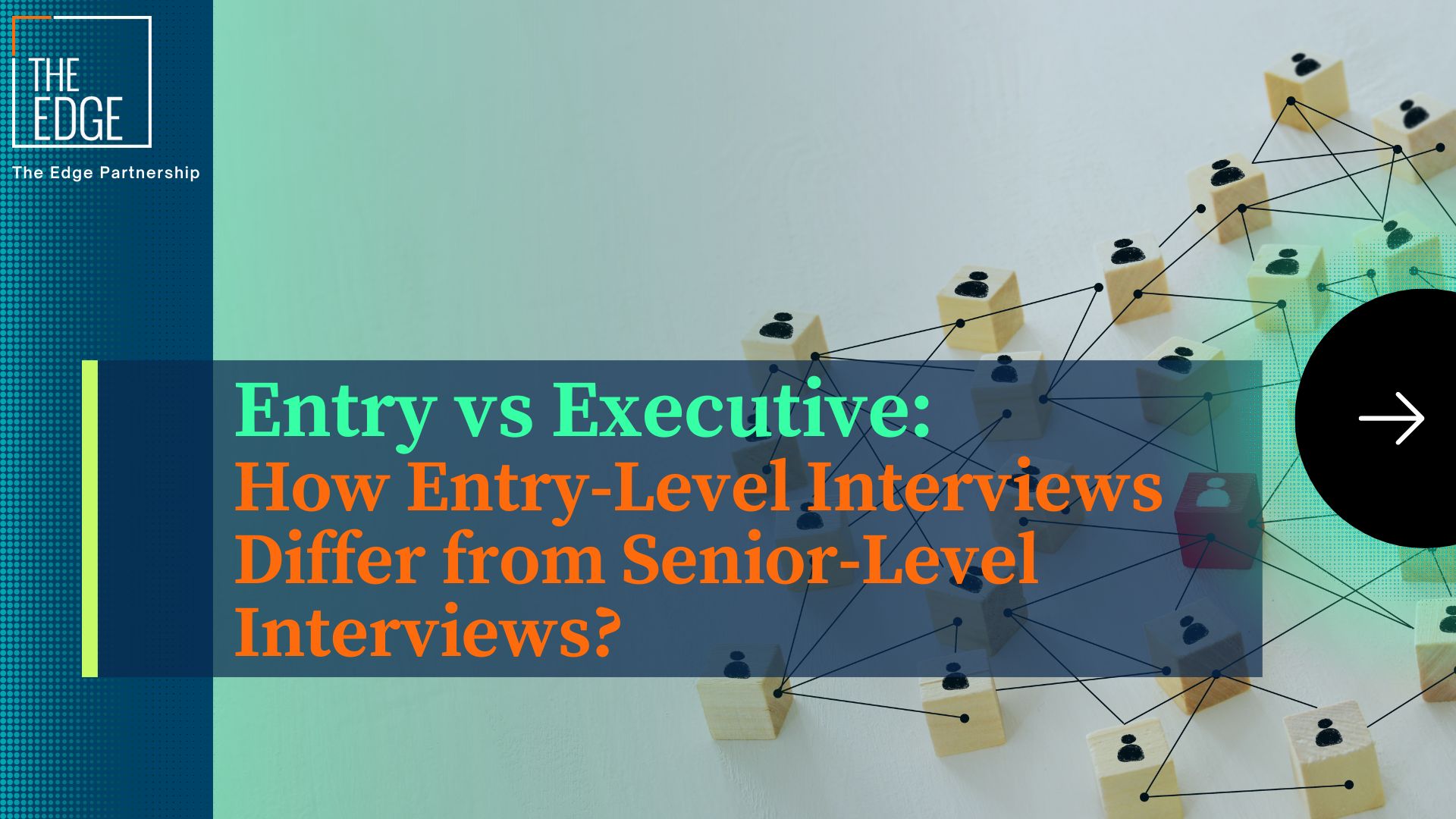
From Entry to Executive: How Entry-Level Interviews Differ from Senior-Level Interviews?
July 2024

July 2024
We all know that entry-level interviews typically involve a series of behavioral questions and some relaxed conversations with the company aiming to assess cultural fit.
But what happens when you advance in your career and start interviewing for senior-level positions? Do these interviews become significantly more challenging, requiring extensive technical knowledge, or does your experience speak for itself?
Entry-level and senior-level interviews have distinct differences, requiring different strategies and preparation. As you progress professionally, it’s crucial to adapt and refine your approach to match the expectations of each stage.
In most entry-level interviews, the focus is on assessing the candidate’s potential rather than their extensive experience.
As recruiters, we often look at the candidates’ educational background such as academic achievements, relevant coursework, and special projects that align with the job role.
Practical experience through internships and part-time jobs, even if limited, is valuable as it demonstrates the candidate’s ability to apply theoretical knowledge in real-world scenarios.
Additionally, soft skills such as communication, teamwork, and problem-solving abilities are crucial. Entry-level candidates are often evaluated on their willingness to learn and their potential to grow within the company.
You can say that entry-level interviews are generally structured and standardised, often including behavioral, technical, and situational questions. For example, a common question might be, “Can you describe a time when you worked in a team to achieve a goal?”
When it comes to technical questions, it all depend on the the field, the candidate’s understanding of fundamental concepts. These questions are typically straightforward, aiming to assess the basic technical knowledge required for the job.
We might also ask you to present hypothetical scenarios to evaluate how you as a candidate might handle specific job-related situations. For instance, “How would you prioritise tasks if you had multiple deadlines to meet?”
For entry-level positions, you’ll find that assessments depends largely on the role and nature of the job — but various assessments such as aptitude tests, personality tests, and technical assessments are common.
These tools help gauge a candidate’s suitability for the role and their potential to succeed. What’s more important is that you should prepare for the interview and share any interests you have that are related to the job, including asking engaging and insightful questions. This will highlight your interest in the position and company.
Senior-level interviews are vastly different from entry-level ones, with a strong emphasis on the candidate’s extensive experience and leadership abilities.
Getting interviews through the front door is a little easier depending on your resume, years of experience and name recognition of past employers.
As recruiters, we delve deep into the candidate’s professional experience, examining past roles, responsibilities, and achievements. It also boils down to evidence of successful project management, innovation, and problem-solving.
Senior-level candidates are expected to demonstrate strong leadership qualities, including the ability to inspire and manage teams, make strategic decisions, and drive organisational growth. In-depth knowledge of the industry, market trends, and competitive landscape is also equally important.
Senior-level interviews are more comprehensive and can even span several rounds. They often include behavioral questions, technical and strategic questions, case studies, presentations, and executive interviews.
Behavioral questions at this level are more complex and focus on leadership experiences and high-stakes decision-making. For instance, “Can you provide an example of a time when you had to make a difficult decision that impacted the entire organisation?”
Technical and strategic questions assess the candidate’s expertise in their field and their ability to think strategically. A typical question might be, “How would you approach developing a new market for our products?”
Candidates may also be asked to analyse a business case and present their findings and recommendations. This assesses their analytical skills, strategic thinking, and ability to communicate effectively. Additionally, meetings with C-suite executives or board members are common to evaluate cultural fit, vision alignment, and overall suitability for the leadership role.
Senior-level candidates may undergo executive assessments, which can include in-depth personality tests, leadership style evaluations, and 360-degree feedback from previous colleagues.
These assessments help determine the candidate’s leadership potential and fit within the organisation’s culture. In-depth personality tests provide insights into the candidate’s traits and how they might influence their leadership style.
Leadership style evaluations assess how candidates lead teams, make decisions, and handle conflicts. 360-degree feedback offers a comprehensive view of the candidate’s performance and behavior from the perspective of peers, subordinates, and superiors.
It’s not just about proving you’re a good fit for the team; you also need to highlight your strategic value.
Employers want to know how you can benefit their business and why they should hire you. It’s essential to showcase your unique strengths and demonstrate how you will positively impact their bottom line.
Understanding what hiring managers are looking for at different stages of your career can help you tailor your interview techniques effectively.
At the end of the day, it’s not just about answering questions; it’s about telling your professional story in a way that highlights your potential impact on their organisation.
We are always hiring for entry-level and senior-level positions. Ready to explore? Head over to The Edge Partnership today for job listings, career advice and new opportunities.